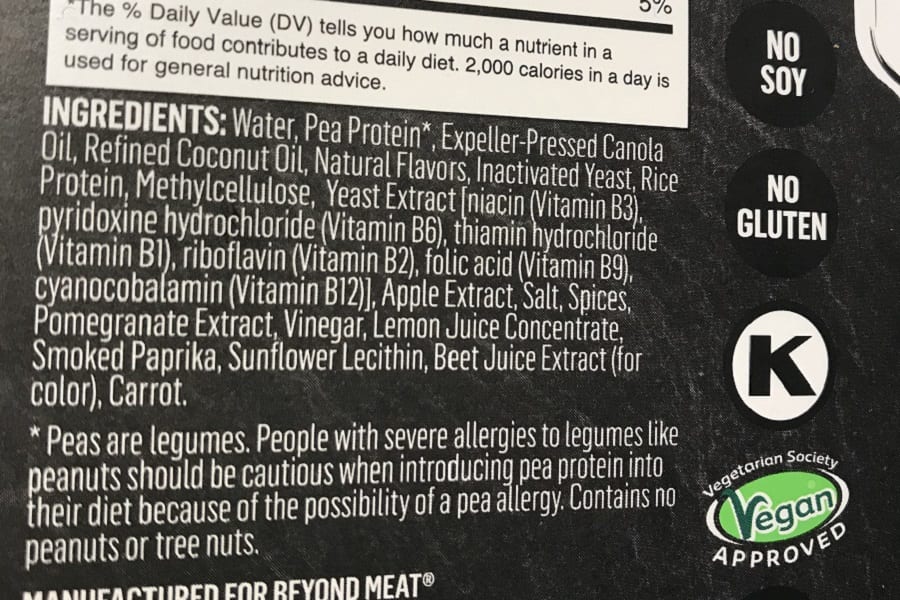
Some requirements for labeling of ingredients in food in the United States have been temporarily loosened due to disruptions in the supply chain caused by the COVID-19 pandemic.
The US Food and Drug Administration (FDA) is allowing food manufacturers some flexibility in substituting one minor ingredient in a food for another or omitting an ingredient without making label changes. Details are outlined in a guidance document.
Several points in the guidance specifically address the substitution of ingredients and gluten, an important issue if you follow the gluten-free diet due to celiac disease or gluten sensitivity. Under the FDA guidance, a gluten-containing ingredient should not be used as a substitute for a gluten-free ingredient. This exclusion is spelled out under the safety, claims and prominence sections of the guidance on temporary labeling put out by the FDA.
A substitution of one ingredient for another should not cause any adverse health effect, including those from gluten and food allergens, according to the FDA. Also, the substitution of an ingredient should not affect any voluntary nutrient or health claim on the label, such as gluten free. Additionally, ingredients that are the subject of a label statement should not be substituted.
The temporary flexibility in labeling came after representatives of the food industry told the agency that supply disruptions and shortages are occurring as a result of the pandemic, according to the FDA.
The FDA says it “does not intend to object” if labeling changes outlined in the guidance are made but notes that guidance does not establish legally enforceable responsibilities and should be viewed as a recommendation.
The FDA points out that existing regulations do deem food to be misbranded if its labeling is false or misleading. “We strongly encourage manufacturers to comply with labeling requirements and continue to make conforming label changes when they need to make formulation changes due to unforeseen supply disruptions or shortages brought on by the COVID-19 pandemic.” However, the agency notes this might not be feasible.
Overall, only minor ingredients, those that constitute 2 percent or less of the weight of a finished food, should be substituted without accompanying label changes. In addition to the top eight food allergens, other ingredients “known to cause sensitivities” should not be substituted. This includes sesame, celery, lupin, buckwheat, molluscan shellfish, mustard and glutamates and sulfites, the FDA says.
“Manufacturers should avoid substitutions that could result in a safety concern without making a conforming label change or providing other means to inform consumers of the change,” the new guidance says.
There is the potential that a gluten-free labeled food could include a substitution of an ingredient, that while still gluten-free, is an allergen not included in the exceptions outlined by the FDA, for example corn starch substituting for potato starch. If you have food allergies in addition to celiac disease, you may have to check with manufacturers about these kinds of substitutions.
Foods that are not labeled gluten-free but appear to be gluten-free by the ingredients list have more potential to include substitutions that might contain gluten. However, a substitution that includes wheat, which is a top eight allergen, should not be made without a consequent labeling change.
A gluten-free diet of mainly fresh, naturally gluten-free foods and products from trusted gluten-free food companies is always the best approach for those with celiac disease and remains so during the COVID-19 pandemic.
The temporary flexibility in labeling is expected to remain in effect only for the duration of the public health emergency declared by the Department of Health and Human Services, including extensions. However, the FDA notes that it may take additional time for the supply chains to return to normal and will determine whether an extension is needed.
The FDA gives examples of the kind of substitution and omission of ingredients anticipated under the more flexible labeling rules. They note It would be permissible to omit green pepper in a vegetable quiche that contains small amounts of multiple vegetables, leave vanilla extract out of a chocolate chip cookie, use one artificial flavoring instead of another as long as the substitution does not pose an allergenic risk, use a different variety of mushroom than the one listed on the label and substitute an ingredient with a different country of origin than is listed on the label.
“The food industry has requested flexibility when manufacturers need to make minor formulation changes that may cause the finished food label to be incorrect, but that do not pose a health or safety issues and do not cause significant changes in the finished food,” the FDA says. “To help ensure a national federal policy that supports an adequate food supply during the pandemic, we are providing temporary labeling flexibilities for minor formulation changes under specific circumstances.”
The agency also notes the critical role accurate label information plays when consumers make decisions about what foods to eat. “Consumers use the ingredient list to make purchasing decisions and determine whether a food contains an ingredient they want, for example whole grains, or do not want due to allergies.” Without this information, consumers cannot avoid ingredients for health reasons, the FDA notes, adding that it is “fundamental” that the temporary labeling flexibility remain in place only as long as need to help ensure an adequate food supply during and after the pandemic.
You can read the FDA temporary policy on food labeling here
Read the response from the FDA here
Read helpful information for manufacturers in response to the FDA policy.
Opt-in to stay up-to-date on the latest news.
Yes, I want to advance research No, I'd prefer not to